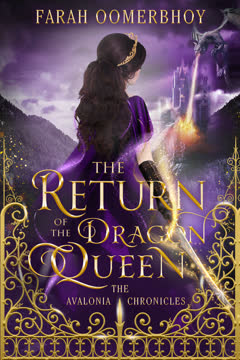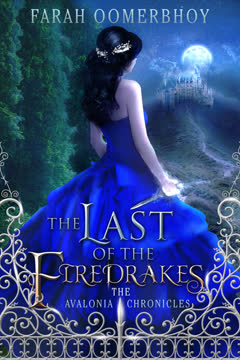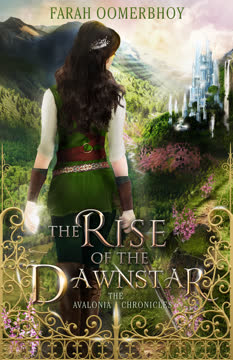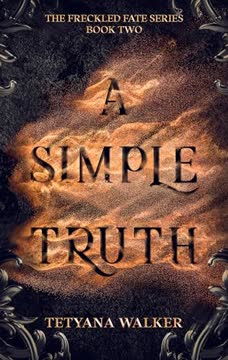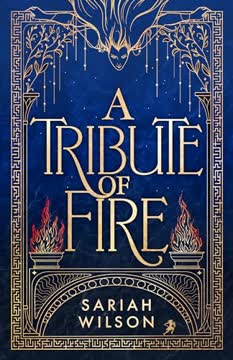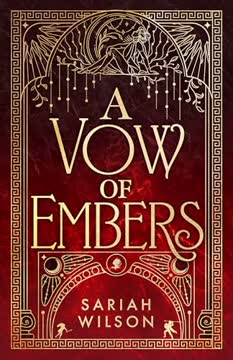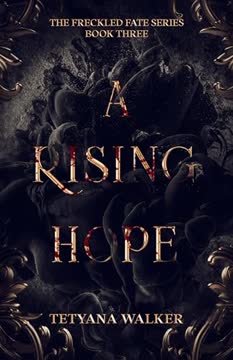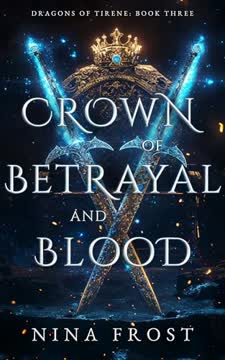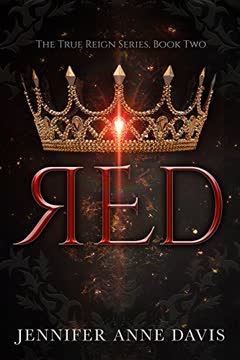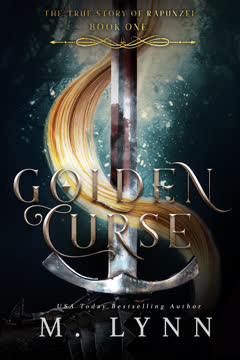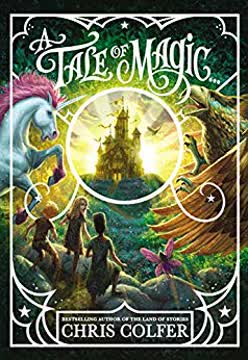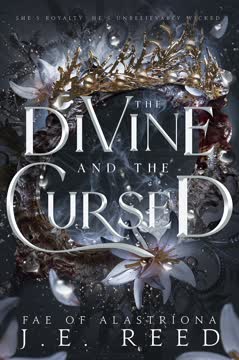Plot Summary
Shadows Over Avalonia
Aurora Firedrake, heir to the throne of Illiador and the legendary Dawnstar, is hunted across Avalonia by the dark queen Morgana and her demonic allies. The story opens with Aurora and her fae protector Tristan evading mercenaries in the desert city of Nedora, Brandor. Their quest: to recover the Book of Abraxas and the Dagger of Dragath, two artifacts that could tip the balance of power. Aurora's relationships are strained—her forced betrothal to Tristan, her love for Rafe, and her grandmother's political machinations all weigh heavily. As Aurora's powers grow, so do the threats, and the fate of the seven kingdoms hangs in the balance.
Betrayals and Bloodlines Revealed
Aurora learns of hidden bloodlines and betrayals that shake her world. Penelope, her mentor, reveals that Kalen is Tristan's half-brother, a secret kept to protect him from fae politics. The Detori family, rulers of Brandor, are revealed to be in league with Morgana, mining blackened iron to forge weapons deadly to the fae. Aurora's rescue of a slave girl, Rhea, exposes the cruelty of Brandorian society and the complicity of its rulers. The lines between friend and foe blur, and Aurora must navigate a web of lies, family secrets, and shifting allegiances to survive.
Slaves, Swords, and Secrets
Staying at the opulent Pink Palace, Aurora uncovers the Detori's role in arming Morgana's forces with blackened iron. Her compassion leads her to free Rhea and other slaves, defying local customs and risking political fallout. Gorgoth attacks and political intrigue escalate, forcing Aurora and her companions to flee. The rescue mission cements Aurora's resolve to fight for all oppressed people, not just her own, and she begins to see her destiny as something greater than reclaiming a throne—it is about bringing hope and justice to Avalonia.
The Pirate Prince's Gambit
Aurora and her allies seek support from Santino, the pirate prince of Sanria, and his father, Emir Valasis. Political negotiations are tense, as Brandor's emirs are divided and wary of open war. The council is rife with treachery—Chancellor Varian and Darius Detori plot with Morgana, aiming to seize power and deliver Brandor to darkness. News of Silverthorne's execution devastates Aurora, but also galvanizes her to act. The need for unity among the kingdoms becomes clear, and Aurora's legend as the Dawnstar begins to inspire hope.
Alliances Forged in Fire
As the threat of Morgana grows, Aurora's circle of allies expands. Penelope, Santino, and even former adversaries like Marcus Gold join the cause. The fae queen Izadora reluctantly gives her blessing for Aurora to intervene in Eldoren, where Rafe's claim to the throne is threatened by the new archmage, Brandon Delacourt. The stakes rise as children of the nobility are taken hostage, forcing Aurora to risk everything for their rescue. The bonds of love, loyalty, and sacrifice are tested as the group prepares for a daring infiltration of Caeleron Castle.
Siege of the Pink Palace
Aurora and her companions orchestrate a bold plan to free Rhea and the other slaves from the Detori mines, exposing the full extent of Brandor's corruption. Their actions ignite hope among the oppressed and fear among their enemies. The escape is fraught with danger, as magical and mundane threats converge. The successful rescue marks a turning point—Aurora is no longer just a fugitive princess, but a symbol of resistance and a leader capable of inspiring change across kingdoms.
The Dagger's Dark Power
In Eldoren, Aurora's quest to save the children and restore Rafe to the throne leads her into a deadly trap. Brandon Delacourt and Lilith, now possessing Calisto, use blackened iron to imprison Aurora and Tristan, nullifying their magic. Betrayal within the resistance exposes the group, and Aurora is forced to confront her own doubts and fears. The Dagger of Dragath, a weapon that can steal fae magic, becomes central to Morgana's plans—and when Aurora is wounded by it, she loses her powers, facing her darkest hour.
Rescue and Ruin in Eldoren
With her magic gone, Aurora is forced to rely on her friends and her own resilience. The rescue of the children succeeds, but at great cost—Vivienne, Aurora's closest friend, is possessed by Lilith, and Rafe is nearly lost. The political landscape shifts as Rafe is crowned king, but personal relationships are strained by grief, guilt, and unresolved love. Aurora's journey becomes as much about reclaiming her sense of self as it is about saving her world.
The Fall of Silverthorne
The execution of Silverthorne, Aurora's uncle and mentor, marks a devastating blow to the resistance. His death is a catalyst for action, forcing Aurora and her allies to confront the reality that victory will require sacrifice. The loss deepens Aurora's resolve, but also her sense of responsibility for the lives lost in the struggle. The lines between personal and political become blurred, as every choice carries consequences for those she loves.
The General's True Face
The mysterious general leading Morgana's armies is revealed to be Joreth, a vessel for the demon lord Dragath. His true goal is to use the Book of Abraxas, the Dagger, and the blood of the Firedrake line to open a portal for a demon army. The revelation that Morgana is not truly a Firedrake, but Joreth's daughter, shakes the foundations of the conflict. The stakes are raised—this is not just a war for a throne, but a battle for the soul of Avalonia itself.
Druidic Mysteries Unveiled
Seeking a cure for Kalen, the group journeys to the hidden druid monastery, braving deadly mists and soul-eating Drakwraiths. The druids heal Kalen and reveal crucial truths about Dragath, the Dagger, and the ancient tapestries that connect worlds and times. The Thirteenth Tapestry, a portal through time, offers a glimpse into the origins of the conflict and the mistakes of the past. Aurora learns that her destiny is intertwined with the fate of all Avalonia, and that only by understanding the past can she hope to save the future.
The Thirteenth Tapestry
Through the Thirteenth Tapestry, Aurora and her companions witness the origins of Dragath's curse, the betrayal of the Nightshade bloodline, and the true parentage of Morgana. The tapestry reveals that only the blood of a Nightshade can activate it, and that the cycle of darkness and light is rooted in ancient choices. The knowledge gained is both a burden and a weapon, arming Aurora for the final confrontation but also forcing her to confront the legacy of her ancestors.
The Siege of Stonegate
The fortress of Stonegate, last stronghold of the dwarves, becomes the site of a desperate battle. Drimli's treachery allows Joreth to seize the final key to the Book of Abraxas. The arrival of Izadora's Elite and the intervention of the witches and Brandorian forces turn the tide, but not before great loss. The battle exposes the fragility of alliances and the ever-present danger of betrayal, even among supposed friends.
The Dark Fortress Beckons
Dragath, now fully awakened in Joreth's body, prepares the ritual to open the portal and unleash his demon army. Aurora, captured and powerless, is forced to witness her father's torture and the near-destruction of her friends. The Dagger's curse threatens to consume her, and only by embracing her true identity as the Dawnstar—and the faith others have in her—can she reclaim her magic. The battle within the Dark Fortress is a crucible, forging Aurora into the leader Avalonia needs.
The Dawnstar's Sacrifice
In a moment of utter despair, Aurora is visited by the spirit of Illaria Lightbringer, who reminds her that her power is rooted in love, hope, and self-belief. By reclaiming her magic from the Dagger, Aurora destroys Dragath and closes the portal, but not without cost. Rafe is mortally wounded, and Vivienne is lost. Aurora faces the ultimate test—choosing between personal happiness and the greater good. Her sacrifice and the intervention of the ancient queens restore balance, but the scars of loss remain.
The Last Stand
With Dragath defeated, Morgana launches a final assault on the fortress. Aurora, now fully the Dragon Queen, summons the ancient fire-fae warriors and the dragon Abraxas to turn the tide. The combined forces of mages, fae, witches, and Brandorians rally to her banner. Morgana is destroyed, the Book of Abraxas is lost, and the armies of darkness are routed. The cost is high, but hope is restored, and the kingdoms of Avalonia are united in a fragile peace.
The Dragon Queen Returns
In the aftermath, Aurora's parents are reunited, and the true line of succession is restored. Political marriages and old contracts are resolved—Aurora is freed from her betrothal to Tristan and chooses Rafe, now immortal, as her partner. Kalen's powers are hidden from his dangerous father, and the wounds of war begin to heal. Aurora embraces her role as the Dragon Queen, not just as a ruler, but as a symbol of hope, unity, and the enduring power of love and faith. The story ends with a sense of renewal and the promise of a brighter future for Avalonia.
Characters
Aurora Firedrake
Aurora is the last of the Firedrake line, heir to Illiador, and the prophesied Dawnstar. Torn between her love for Rafe and her forced betrothal to Tristan, Aurora's journey is one of self-discovery, sacrifice, and growth. She is compassionate, impulsive, and fiercely loyal, often risking her own safety for others. Her greatest struggle is with self-doubt and the burden of destiny, but through loss and hardship, she learns that true power comes from faith, love, and the courage to choose hope over despair. Aurora's arc is a transformation from fugitive princess to unifying queen, embodying the light that can dispel even the deepest darkness.
Tristan Nightshade
Tristan is the Prince of the Night Court, bound to Aurora by oath and political necessity. Stoic, disciplined, and burdened by a tragic past, he is both a mentor and a friend to Aurora. His hatred of mages is rooted in personal trauma, but his loyalty to Aurora transcends old prejudices. Tristan's internal conflict—between duty and desire, darkness and light—mirrors the larger struggle of Avalonia. His relationship with his newfound brother Kalen and his evolving feelings for Ashara add depth to his character, revealing a capacity for growth and redemption.
Rafe (Rafael Ravenswood)
Rafe is Aurora's true love and the rightful King of Eldoren. Charismatic, brave, and resourceful, he is a natural leader who inspires loyalty. Rafe's journey is marked by sacrifice—giving up his throne, risking his life for Aurora, and enduring heartbreak. His immortality, granted by Illaria Lightbringer, is both a blessing and a burden, symbolizing the eternal nature of true love. Rafe's unwavering support helps Aurora find her strength, and his own arc is one of acceptance, forgiveness, and embracing his destiny as both king and partner.
Penelope
Penelope is Aurora's mentor and a powerful spirit-fae, sister to the fae queen Izadora. She is a master of disguise, espionage, and diplomacy, often working behind the scenes to guide events. Penelope's greatest secret is her son Kalen, whose hidden heritage is a source of both pride and fear. Her relationship with Aurora is maternal, blending tough love with deep compassion. Penelope's arc is one of atonement—making amends for past mistakes and ensuring the next generation is prepared for the challenges ahead.
Kalen
Kalen is Penelope's son and Tristan's half-brother, raised unaware of his true heritage. Cheerful, loyal, and eager to prove himself, Kalen's latent powers are both a gift and a curse. His journey from naïve youth to empowered fae is fraught with danger, as his abilities make him a target for those who would exploit him. Kalen's struggle to define his own identity, apart from the expectations of others, is a microcosm of the larger theme of self-determination.
Morgana
Morgana is the primary antagonist, driven by a hunger for power and a deep-seated sense of betrayal. Her true parentage—as the daughter of Joreth and Lilith, not a Firedrake—fuels her resentment and shapes her actions. Morgana is cunning, ruthless, and charismatic, able to inspire both fear and loyalty. Her alliance with demonic forces and willingness to sacrifice anything for her goals make her a formidable foe. Morgana's arc is a cautionary tale about the corrosive nature of unchecked ambition and the dangers of denying one's true self.
Joreth / Dragath
Joreth, once a mage, becomes the vessel for Dragath, the demon lord. As the mastermind behind Morgana's rise and the architect of Avalonia's near-destruction, he represents the seductive allure of forbidden knowledge and the consequences of hubris. Dragath's goal—to open a portal for his demon army—raises the stakes from political intrigue to existential threat. His manipulation of bloodlines, artifacts, and ancient magic is a reminder that the past's sins can echo through generations.
Vivienne
Vivienne is Aurora's closest friend from the Academy, whose possession by Lilith and eventual death are among the story's most heartbreaking moments. Her arc is a testament to the collateral damage of war and the personal cost of heroism. Vivienne's fate haunts Aurora, serving as a constant reminder of what is at stake and the price of failure.
Santino
Santino is the charismatic ruler of Sanria, whose transformation from self-interested rogue to Sultan of Brandor is a key turning point. His willingness to abolish slavery and unite the Brandorian emirs under his banner demonstrates the power of leadership and the possibility of redemption. Santino's friendship with Aurora and his alliance with the witches of Rohron are instrumental in turning the tide of war.
Ashara
Ashara is the leader of the witches of Rohron, a formidable fighter and a symbol of Avalonia's diversity. Her alliance with Aurora and her growing bond with Tristan challenge old prejudices and demonstrate the strength found in unity. Ashara's pragmatic approach and unwavering courage make her an essential part of the resistance, embodying the theme that true power lies in cooperation and mutual respect.
Plot Devices
Prophecy and Destiny
The narrative is driven by prophecy—the Dawnstar's return, the rise of the Dragon Queen, and the threat of Dragath's awakening. Characters struggle with the tension between destiny and free will, questioning whether their paths are predetermined or shaped by their choices. This device creates suspense and emotional depth, as Aurora must learn to embrace her role without losing her sense of self.
Magical Artifacts
The Book of Abraxas, the Dagger of Dragath, the Amulet of Auraken, and the Thirteenth Tapestry are central to the plot. Each artifact represents a different aspect of power—knowledge, destruction, protection, and time. Their pursuit drives the action, while their use and misuse explore themes of responsibility, sacrifice, and the corrupting influence of unchecked ambition.
Hidden Lineage and Secret Identities
The revelation of true parentage—Morgana's, Kalen's, and even Aurora's—serves as a catalyst for character development and plot twists. These secrets challenge characters' perceptions of themselves and others, forcing them to confront uncomfortable truths and redefine their loyalties.
Betrayal and Redemption
Betrayal is a recurring motif—whether by family, friends, or political allies. The pain of betrayal is balanced by moments of forgiveness and redemption, as characters like Skye and Santino choose to change sides or atone for past wrongs. This device heightens emotional stakes and underscores the theme that no one is beyond hope.
Sacrifice and Resurrection
Characters are repeatedly asked to sacrifice for the greater good—Aurora's loss of magic, Silverthorne's execution, Rafe's near-death. The motif of resurrection—literal and metaphorical—reinforces the idea that hope can be reborn from despair, and that true leadership requires both strength and vulnerability.
Foreshadowing and Parallelism
The use of the Thirteenth Tapestry and visions of the past create a sense of inevitability, while also offering opportunities to break the cycle of darkness. Parallels between past and present—such as the choices of ancestors and their consequences—invite readers to reflect on the power of history and the importance of learning from mistakes.
Analysis
Farah Oomerbhoy's The Return of the Dragon Queen is a sweeping fantasy that explores the interplay of destiny, choice, and the enduring power of hope. At its core, the novel is about the struggle to define oneself in the face of overwhelming expectations—whether those are the prophecies of ancient magic, the demands of family, or the weight of history. Aurora's journey from reluctant princess to Dragon Queen is both epic and deeply personal, marked by loss, love, and the gradual realization that true power lies not in magic or birthright, but in the courage to choose light over darkness. The story's rich tapestry of characters and cultures—fae, mages, witches, and mortals—reflects a world where unity is hard-won and always fragile. The novel's use of magical artifacts and hidden lineages serves as both plot engine and metaphor, reminding readers that the past is never truly past, and that healing requires both acknowledgment of old wounds and the willingness to forge new paths. Ultimately, the book's message is one of resilience: that even in the darkest times, faith—in oneself, in others, and in the possibility of change—can summon the light needed to banish the shadows.
Last updated:
Review Summary
The Return of the Dragon Queen received mostly positive reviews, with an average rating of 4.29/5. Readers praised the exciting plot, world-building, and satisfying conclusion to the trilogy. Some criticized the rushed pacing, underdeveloped characters, and repetitive writing. Many found the book emotionally engaging and enjoyed the magic system and plot twists. Critics felt the love triangle was messy and some character decisions unrealistic. Overall, fans of YA fantasy appreciated the series' conclusion, while others found it lacking depth.
